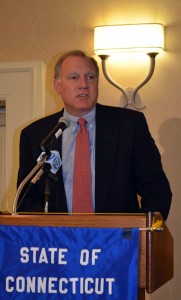FOI Day: Can Free Information and Economic Development Co-Exist?
By Don Stacom
One of the biggest crowds in recent memory for an annual Connecticut FOI Conference turned out April 3 to hear spirited debates about how — or if — free information and economic development can co-exist.
Panels and workshops also provided news about recent FOI precedents and interpretations, along with insights into the latest issues surrounding public access to information.
The key debate featured Andrew. J. McDonald, the governor’s chief legal counsel, and Preston First Selectman Robert Congon arguing for why government wants — and corporations demand — temporary secrecy during sensitive bargaining about economic development.
Taxpayers aren’t well served if detailed news reports in mid-negotiation scare off companies that might have brought jobs and tax dollars to the state, they said.
On the other side, Connecticut Mirror reporter Keith M. Phaneuf joined Agility Resources Group President Vincent M. Valvo, a former Hartford Courant reporter, in giving the case for faster and more extensive transparency.
“Ever since the first bill was passed, we’ve done nothing to expand it. What comes out every year at the Legislature are attempts to restrain it and pull it back,” Valvo said. “We ought to be embracing a culture of openness.”
Phaneuf offered a series of examples of state bureaucrats illegally withholding information for reasons as petty as personal convenience. For years, one state agency refused to give out financial documents until two days after distributing them to legislators, defending the policy as merely “being sure that everyone is comfortable” with the numbers, he said.
“There is no comfort clause in the FOI law,” Phaneuf pointed out.
But he also acknowledged that years of cost-cutting are responsible for many of the media’s failings as a watchdog. Too few young reporters understand FOI law or how to use it effectively, he said.
“The media today is shrinking, inexperienced and borderline irresponsible — I’m tempted to take the ‘borderline’ out,” Phaneuf said. “We’re lucky if the (Capitol) press corps is one-quarter the size of what it was in 1988, and probably has one-quarter of the experience level.”
The conference was sponsored by the Connecticut Freedom of Information Commission, the Connecticut Foundation for Open Government and the Connecticut Council of Freedom of Information.

No comments yet
Comments are closed